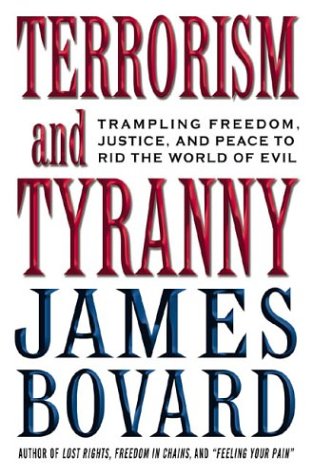I was sweeping away some clutter today and came across this clip of one of the first pieces I wrote for a national paper on the War on Terrorism. Most editors saw me back then as hopelessly cynical, but Chris Collins at the USA Today editorial page gave me a shot. She was always great to work with. Here are my favorite lines from this piece:
- The word “terrorism” must not become an incantation that miraculously razes all existing limits on government power.
- The war on terrorism threatens to become a license for tyranny.
- Governments have committed far worse abuses than al-Qaeda or any other terrorist cabal.
- Some governments are little more than criminal conspiracies against their victims.
- In the long run, people have far more to fear from governments than from terrorists.
- The Patriot Act decimates individual privacy by giving the FBI the de facto right to vacuum up practically anyone’s e-mail.
USA TODAY, January 10, 2002 
Don’t bed down with tyrants to fight terrorism
By James Bovard
President Bush recently declared: “So long as anybody’s terrorizing established governments, there needs to be a war.” Bush rightfully sought international support for the campaign to put the al-Qaeda terrorist network out of business. But the war on terrorism threatens to become a license for tyranny.
The United Nations is concerned that an expansive call for governments to crack down on terrorism — a crime that is not clearly defined — is spurring a surge of oppression around the world. Los Angeles Times writer William Orme detailed some of the ways governments are exploiting the new war to repress their citizens:
The Cuban government, as part of its war on terrorism, added a new law allowing the death penalty for anyone who uses the Internet to incite political violence.
Zimbabwe’s war on terrorism includes a proposal to criminalize any critical comment about President-dictator Robert Mugabe.
Syria bragged to the U.N. that financial support for terrorists was effectively curtailed by the absence of any private banking system or independent charities, Orme reported. In other words, a government that totally destroys freedom expects to be applauded as an anti-terrorist superstar.
Bacre Waly Ndiaye, a chief U.N. human-rights officer, recently complained: “In some countries, non-violent activities have been considered as terrorism, and excessive measures have been taken to suppress or restrict individual rights, including the presumption of innocence, the right to a fair trial, freedom from torture, privacy rights, freedom of expression and assembly, and the right to seek asylum.”
Here at home
Many of these complaints, in fact, apply to the actions of the Bush administration. A new law decimates individual privacy by giving the FBI the de facto right to vacuum up practically anyone’s e-mail. Permanent resident aliens who publicly criticize the U.S. government’s war on terrorism can be banned from re-entering the United States. Some have floated the suggestion that permitting the torture of suspects could help avert future terrorist attacks. And Bush’s executive order for military tribunals threatens to bring unsavory aspects of Third World “justice” to American shores.
A myopic focus on private-sector criminals risks giving a green light to more dangerous government abuses. A core fallacy of the war on terrorism — as opposed to attacking and destroying al-Qaeda — is that terrorism is worse than anything else imaginable. Unfortunately, governments have committed far worse abuses than al-Qaeda or any other terrorist cabal.
Official murderers
Mass murder was the most memorable achievement of some 20th-century governments. The Black Book of Communism, a 1997 scholarly French compendium, detailed how 85 million to 100 million people came to die at the hands of communist regimes in the Soviet Union, China, Cambodia and elsewhere. In Death by Government, R.J. Rummel declared that some 170 million people were killed in one of “the myriad ways governments have inflicted death on unarmed, helpless citizens and foreigners.”
By raising terrorist attacks to the pinnacle of political evil, the war on terrorism implicitly sanctifies whatever tactic governments use in the name of repressing terrorism. But, in the long run, people have far more to fear from governments than from terrorists.
Bush’s labeling of attacks on any “established government” as a justification of counterterrorism ignores the fact that some governments are little more than criminal conspiracies against their victims. The United States was created as a result of popular uprisings and attacks on an established government that was far less oppressive than many current regimes in Africa and Asia.
The Bush administration must find a way to fight terrorism without sanctifying tyranny. The word “terrorism” must not become an incantation that miraculously razes all existing limits on government power. The fact that governments such as Syria and Zimbabwe can justify their oppression by invoking the war against terrorism is an embarrassment to anyone who both opposes terrorism and favors human rights.
James Bovard is the author of Lost Rights and Freedom in Chains.
***
I expanded on the ideas in this article in my 2003 book, Terrorism & Tyranny –
![]()


Comments are closed.